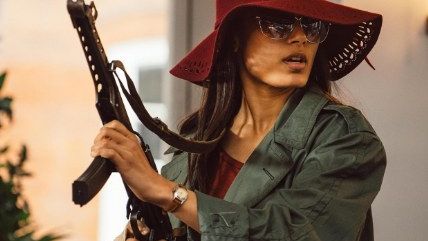Guerrilla Lobs Bombs at Romanticized History of '70s Violence
Political terrorism intersects with pettier motivations.


Guerrilla. Showtime. Sunday, April 16, 9 p.m.
Before we get to everything else about Showtime's Guerrilla—how it's intelligent, insightful, resonant, well-acted and all that—let's deal with the mysterious question of why a show about an underground black-nationalist terrorist group of the 1970s, written and produced by Americans, would be set in Great Britain.
To be sure, London had its share (actually, much more than its share) of political terrorism in the 1970s. But nearly all of it was connected to the issue of Northern Ireland. Neither the British black-power movement nor the government response to it ever reached the extreme levels of violence that wracked their counterparts in the United States; there was no Mayfair chapter of the Black Panthers. The 1970s underground group that most closely resembles the one portrayed in Guerrilla was the Black Liberation Army, the Panther offshoot for which JoAnne Chesimard, a.k.a. Assata Shakur, robbed banks and shot it out with cops, but it was a purely American affair.
The most obvious answer for the show's peculiar venue is that it's a co-production with Great Britain's Sky TV, which seemed to suggest that Guerrilla's creator-writer-director John Ridley, who won a screenwriting Oscar for 12 Years a Slave, couldn't round up enough funding within the United States.
Why that should be is just one of those Hollywood imponderables. Guerrilla is a thoughtful and undidactic look at a time when the left went from nutty to nihilistic. In one 18-month stretch of 1971-72, the FBI recorded more than 2,500 bombings in the United States, more than five a day. And much of the revolutionary violence was directed not at the war in Vietnam, where American involvement was in steep decline, but at racial iniquities. Underground American groups like the Weathermen and the Symbionese Liberation Army explicitly declared that their violence was committed to combat black oppression, even if the fingers that were pulling the triggers or lighting the fuses were, in many cases, white. The Black Lives Matter movement is different in many, many ways, but the echoes are there nonetheless.
Frieda Pinto (Slumdog Millionaire) and Babou Ceesay ('71) play the politically engaged young lovers Jas and Marcus. Marcus is a black teacher whose revolutionary impulses are strictly cerebral; trying to blaze the way for the fulfillment of Ho Chi Minh's dictum that "when the prison gates are opened, the real dragon will fly out," he spends his spare time teaching classes at a London jail, educating future cadres. Jas, a nurse and a red diaper baby with daddy issues (her father is in jail in India for killing soldiers), is less patient. "I have to be with someone who wants to do things," she warns Marcus.
They're both jolted to action when a black friend is beaten to death by cops at a protest rally. But they immediately learn how easily violence can spiral out of control, when, breaking a Marxist street criminal named Dhari (Nathaniel Martello-White, Red Tails) out of jail in hopes that he can provide their movement with more muscular leadership, they accidentally kill a guard.
Marcus is stricken by the blood on his hands, even when the hard-boiled Dhari scoffs, "No use talking you didn't do this, you didn't do that—you're in it." Jas, on the other hand, is enchanted to hear news reports speculate that their little group must be veteran revolutionaries, perhaps even an offshoot of the Panthers. "We're so fucking cool," she exclaims to Marcus, even as her newfound notoriety spurs her into new fits of rage.
Ridley's keenly observant script clearly draws on the multiplying accounts of life underground by 1970s survivors who've come in from the cold, not only for details of the grungy day-to-day existence (Jas and Marcus at one point are reduced to grabbing scraps of food off un-bussed trays of dirty restaurant dishes) but the larger issue of how radical rhetoric sometimes was sometimes false-flag justification for violence committed out of personal frustrations and jealousies.
Watching Jas taunt Marcus into becoming a left-wing Clyde Barrow to her Bonnie Parker, I was reminded of New Left bomber Jane Alpert's abashed confession that one of the most infamous terrorist actions in which she participated—the bombing of a Wall Street bank that sent 20 people away in ambulances—was mostly the work of her angry boyfriend. "Because I had threatened to abandon him, for even one night, by sleeping with another man," she wrote in a later memoir, "he had taken revenge on a skyscraperful of people."
Guerrilla captures that and much more. Anyone who was around as the bombast of the 1960s turned into the bombs of the 1970s will not be able to feel a sad nostalgia and a tragic sense of inevitability at this mesmerizing spectacle of naivete, idealism, kiddie bravado and ultimately the sheer stupidity of kids playing with fire. If you can remember the 1960s, goes the cliche, you weren't there. But in Guerrilla, the memories of the 1970s linger, and burn.


Show Comments (22)